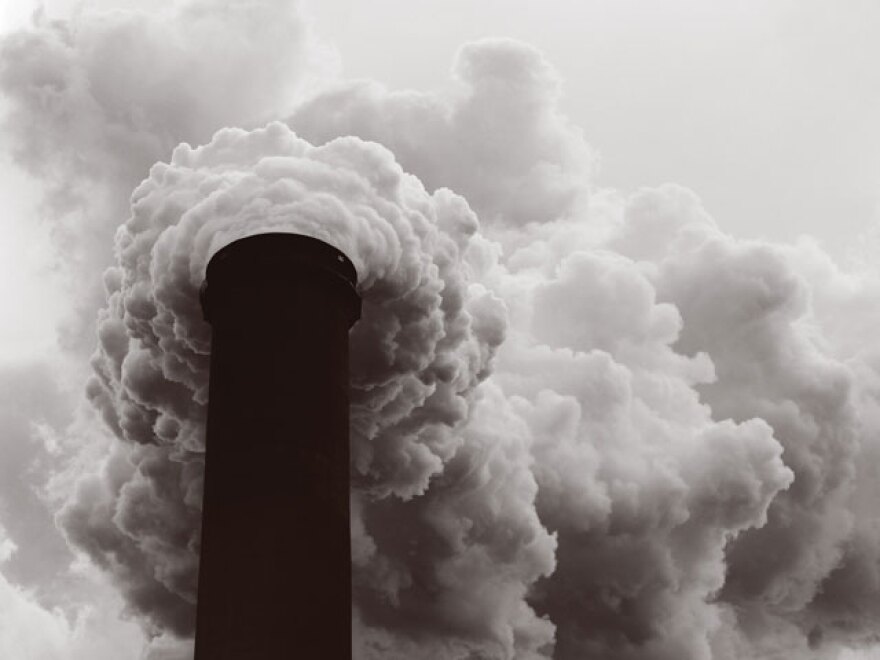There is a consensus among scientists that global warming is occurring, and the increase in temperature is man-made. The U.N.'s Intergovernmental Panel on Climate Change (IPCC) is currently preparing a new report on the topic that is expected to include strongly worded warnings to reduce the world's consumption of fossil fuels.
But the debate remains in American political circles. What are the facts? Why is there so much debate? St. Louis on the Air host Don Marsh put those questions and more to scientists David Titley and Kyra Krakos.
Titley is a senior scientist in the department of meteorology at Pennsylvania State University and the director of the university's Center for Solutions to Weather and Climate Risk. He is also a retired rear admiral with the U.S. Navy. Krakos is an assistant professor of biology at Maryville University and a research associate at the Missouri Botanical Garden.
Part of the issue is perspective, said Titley. People look at the weather of the last few weeks, and as long as it is normal they don't think about the wider trend of climate.
"If we have a warm winter, we say oh jeez the climate's changing. If we have a cold and snowy winter, it's like, ah the climate's fine, everything is good. If we have a huge drought like we did last year out in the Midwest people get worried, when the rain comes back it's not so much," said Titley.
But he added, the evidence for climate change is there.
"If you just strip it down to the bare essentials, the science community has known since the middle of the 19th century, the 1850s, 1860s, that carbon dioxide actually keeps heat in the atmosphere," said Titley. "You can look at air temperatures, ocean temperatures, you watch what the ecosystems are doing, you look at the glaciers, you look at the ice in the Arctic, you look at the sea level, and maybe you could argue with any one of those individual data sets. But it takes a really, really hard to understand explanation to kind of explain away all of that change at one time."
As a biologist, Kyra Krakos investigates the impact climate change has on plant life.
"(It) might not sound nearly as exciting as large sheets of ice breaking off and the oceans rising, but it does affect what we eat. It affects our food supply, it affects our economics," said Krakos. "Particularly our little pollinators turn out to be tremendously important, and quite impactful, especially in the area of agriculture. Over 80 percent of our plants rely on pollinators to set seed. And we are not capable of handling that workload."
"One of the concerns with climate change, is that even small shifts in weather patterns and in climate can really impact where plants are, where they grow, how widespread they are, and then how long they grow," Krakos added. "Now you have plants and pollinators that are interacting that have never interacted before. They are competing for pollinators, or they're being out-competed in general for space. And all of those things...disrupt the dynamics of what we have based our ecosystem decisions on. Not just what you decide to plant in your garden, but on big agricultural decisions. And that is a very large concern."
Although the weight of scientific evidence shows that human consumption of fossil fuels has increased the earth's temperature, convincing the public to accept that evidence is not so simple.
However, Krakos is encouraged by the fact that most of her students accept global warming as reality. She focuses on teaching her students how to find reliable information.
And despite the political debate, she is hopeful that solutions can be found. As she put it, "there is common ground to build on, we all want to be safe, we all want to be healthy."
Related Event
Town & Country Green Speaker Series and Maryville University Present a Discussion on Climate Change and the Documentary "Earth: The Operators' Manual"
Thursday, October 3, 2013
7:00 p.m.
Maryville University's Buder Commons, 650 Maryville University Drive
For more information, see the Green Speaker Series website or the Green Speaker Series Facebook page.
St. Louis on the Air provides discussion about issues and concerns facing the St. Louis area. The show is produced by Mary Edwards and Alex Heuer and hosted by veteran journalist Don Marsh.






